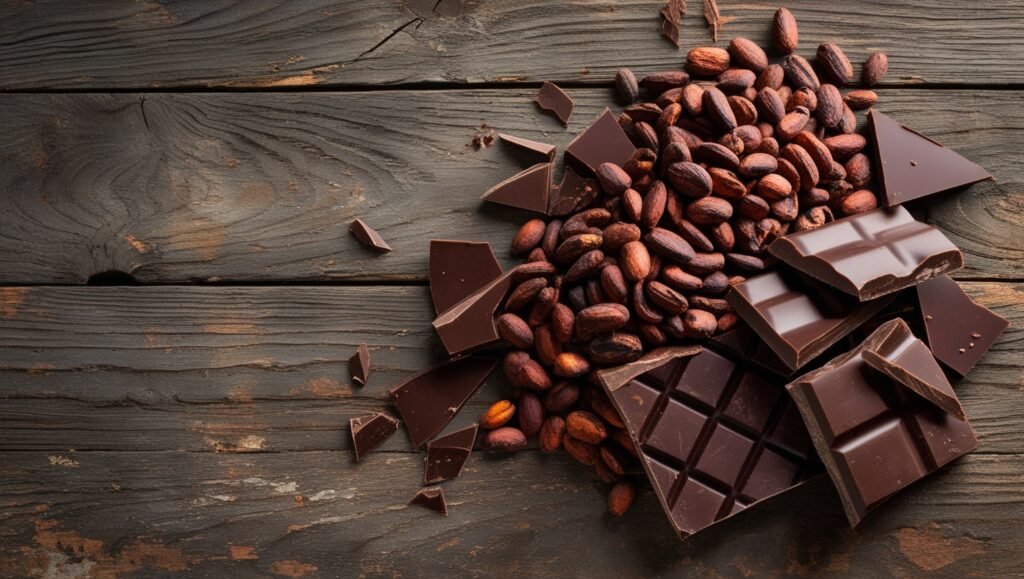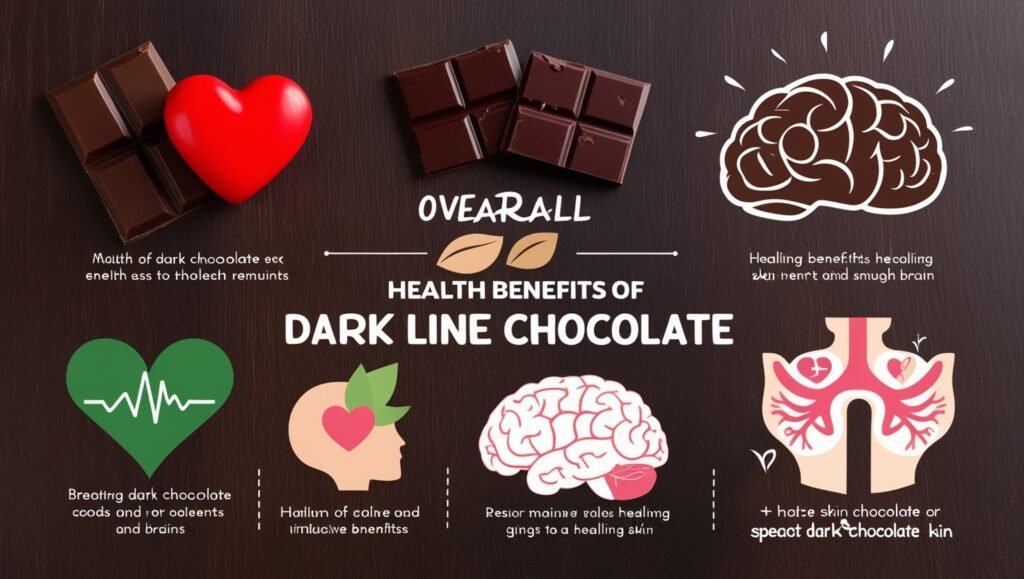
Dark chocolate, often considered a delightful indulgence, has earned its place as a significant player in the world of healing foods. Beyond its rich flavor and satisfying texture, dark chocolate offers numerous health benefits that make it a powerful addition to any diet. This comprehensive guide explores the healing properties of dark chocolate, its nutritional profile, and how you can incorporate it into your daily routine for optimal health benefits.

Nutritional Profile of Dark Chocolate
Dark chocolate is derived from the seed of the cacao tree and is renowned for its high antioxidant content. Here are some key nutrients found in dark chocolate:
Fiber: Dark chocolate contains a good amount of dietary fiber, which aids in digestion and helps maintain healthy cholesterol levels.
Iron: Essential for blood production, dark chocolate provides a significant amount of iron.
Magnesium: Vital for muscle and nerve function, dark chocolate is a rich source of magnesium.
Copper: Important for various bodily functions, including maintaining healthy bones and nerves.
Manganese: Necessary for bone formation and metabolism, dark chocolate is a good source of manganese.
1. Rich in Antioxidants
Dark chocolate is loaded with powerful antioxidants, which are substances that help neutralize free radicals in the body. Free radicals are unstable molecules that can damage cells and contribute to aging and diseases. The antioxidants in dark chocolate, such as flavonoids and polyphenols, play a crucial role in reducing oxidative stress and inflammation.
2. Supports Heart Health
One of the most notable benefits of dark chocolate is its positive impact on heart health. The flavonoids in dark chocolate help improve blood flow, reduce blood pressure, and lower the risk of cardiovascular diseases. Regular consumption of dark chocolate can help prevent the oxidation of LDL cholesterol, which is a significant factor in heart disease. This makes dark chocolate a heart-healthy healing food.
3. Enhances Brain Function
Dark chocolate has been shown to improve brain function by increasing blood flow to the brain. The flavonoids in dark chocolate can enhance cognitive function and reduce the risk of neurodegenerative diseases. Additionally, dark chocolate contains stimulant substances like caffeine and theobromine, which can improve brain function in the short term.
4. Anti-Inflammatory Properties
Chronic inflammation is a major contributor to many serious diseases, including heart disease, cancer, and diabetes. Dark chocolate has potent anti-inflammatory effects that can help reduce inflammation in the body. The antioxidants in dark chocolate help neutralize free radicals and reduce inflammation, making it a powerful healing food.
5. Improves Skin Health
The bioactive compounds in dark chocolate can be beneficial for your skin. The flavonoids protect against sun damage, improve blood flow to the skin, and increase skin density and hydration. Studies have shown that consuming dark chocolate can protect your skin from the harmful effects of UV rays, making it a great addition to your skincare routine.
6. Regulates Blood Sugar Levels
Despite its sweet taste, dark chocolate has a low glycemic index, meaning it does not cause a rapid spike in blood sugar levels. The flavonoids in dark chocolate can improve insulin sensitivity, which can help reduce the risk of diabetes. This makes dark chocolate a suitable treat for those looking to manage their blood sugar levels.
7. Boosts Mood
Dark chocolate contains several compounds that can improve mood and mental well-being. It stimulates the production of endorphins, which are chemicals in the brain that create feelings of pleasure. Dark chocolate also contains serotonin, a neurotransmitter that acts as an antidepressant. The presence of theobromine and caffeine provides a mild stimulant effect, improving mood and energy levels.
8. Promotes Digestive Health
Dark chocolate is a good source of dietary fiber, which is important for maintaining healthy digestion. Fiber helps promote regular bowel movements and prevent constipation. Additionally, dark chocolate contains prebiotics, which are compounds that support the growth of beneficial bacteria in the gut. This can help maintain a healthy gut microbiome and improve overall digestive health.

How to Incorporate Dark Chocolate into Your Diet
Incorporating dark chocolate into your diet is easy and delicious. Here are some ideas on how to enjoy this healing food:
As a Snack: Enjoy a small piece of dark chocolate as a snack. Aim for chocolate that is at least 70% cocoa to get the maximum health benefits.
In Smoothies: Add a tablespoon of cocoa powder to your smoothies for a rich, chocolatey flavor.
Baking: Use dark chocolate chips in your baking recipes, such as cookies, muffins, or brownies.
Hot Chocolate: Make a healthy hot chocolate using dark cocoa powder, milk, and a natural sweetener like honey or maple syrup.
With Fruit: Pair dark chocolate with fruits like strawberries, bananas, or oranges for a sweet and nutritious treat.

Frequently Asked Questions (FAQ)
Q: How much dark chocolate should I eat daily for health benefits?
A: It is recommended to consume about 1 to 2 ounces (30 to 60 grams) of dark chocolate per day. Eating too much can lead to excess calorie intake and potential weight gain.
Q: Is dark chocolate suitable for people with diabetes?
A: Dark chocolate with a high cocoa content (70% or more) and low sugar content can be a suitable treat for people with diabetes when consumed in moderation. It has a low glycemic index and can improve insulin sensitivity.
Q: Does dark chocolate contain caffeine?
A: Yes, dark chocolate contains small amounts of caffeine. However, the caffeine content is much lower than that found in coffee. A typical 1-ounce serving of dark chocolate contains about 20 milligrams of caffeine.
Q: Can dark chocolate help with weight loss?
A: Dark chocolate can be part of a weight loss diet when eaten in moderation. It can help reduce cravings and make you feel fuller for longer, thanks to its rich fiber content.
Q: Are there any side effects of eating dark chocolate?
A: While dark chocolate is generally safe to consume, eating it in large amounts can lead to excessive calorie intake, which might result in weight gain. Additionally, some people may experience allergic reactions or digestive issues due to certain compounds in dark chocolate.
Q: What is the difference between dark chocolate and milk chocolate?
A: The main difference lies in the cocoa content. Dark chocolate contains a higher percentage of cocoa (usually 70% or more) and less sugar compared to milk chocolate. This makes dark chocolate richer in antioxidants and more beneficial for health.
Q: Can dark chocolate improve athletic performance?
A: Some studies suggest that the flavonoids in dark chocolate can improve athletic performance by increasing blood flow and oxygen availability to muscles. However, more research is needed to confirm these findings.
Q: Is dark chocolate vegan?
A: Pure dark chocolate made from cocoa solids, cocoa butter, and sugar is typically vegan. However, some brands may add milk products, so it’s essential to check the ingredients list to ensure it’s vegan-friendly.
Q: How should I store dark chocolate?
A: Dark chocolate should be stored in a cool, dry place away from direct sunlight. The ideal temperature is between 60-70°F (15-21°C). Avoid storing it in the refrigerator as it can cause the chocolate to develop a white film (bloom) on the surface, which doesn’t affect its taste but can alter its texture.
Q: Can children eat dark chocolate?
A: Yes, children can eat dark chocolate in moderation. However, due to its higher caffeine content compared to milk chocolate, it’s best to give it in small amounts.

Conclusion
Dark chocolate is a delicious and nutritious treat that offers a multitude of health benefits. From improving heart and brain health to enhancing skin and mood, its healing properties make it a valuable addition to your diet. By choosing high-quality dark chocolate with a high cocoa content, you can enjoy its rich flavors and reap its numerous health benefits. So, the next time you crave something sweet, reach for a piece of dark chocolate and indulge in this delightful healing food.



